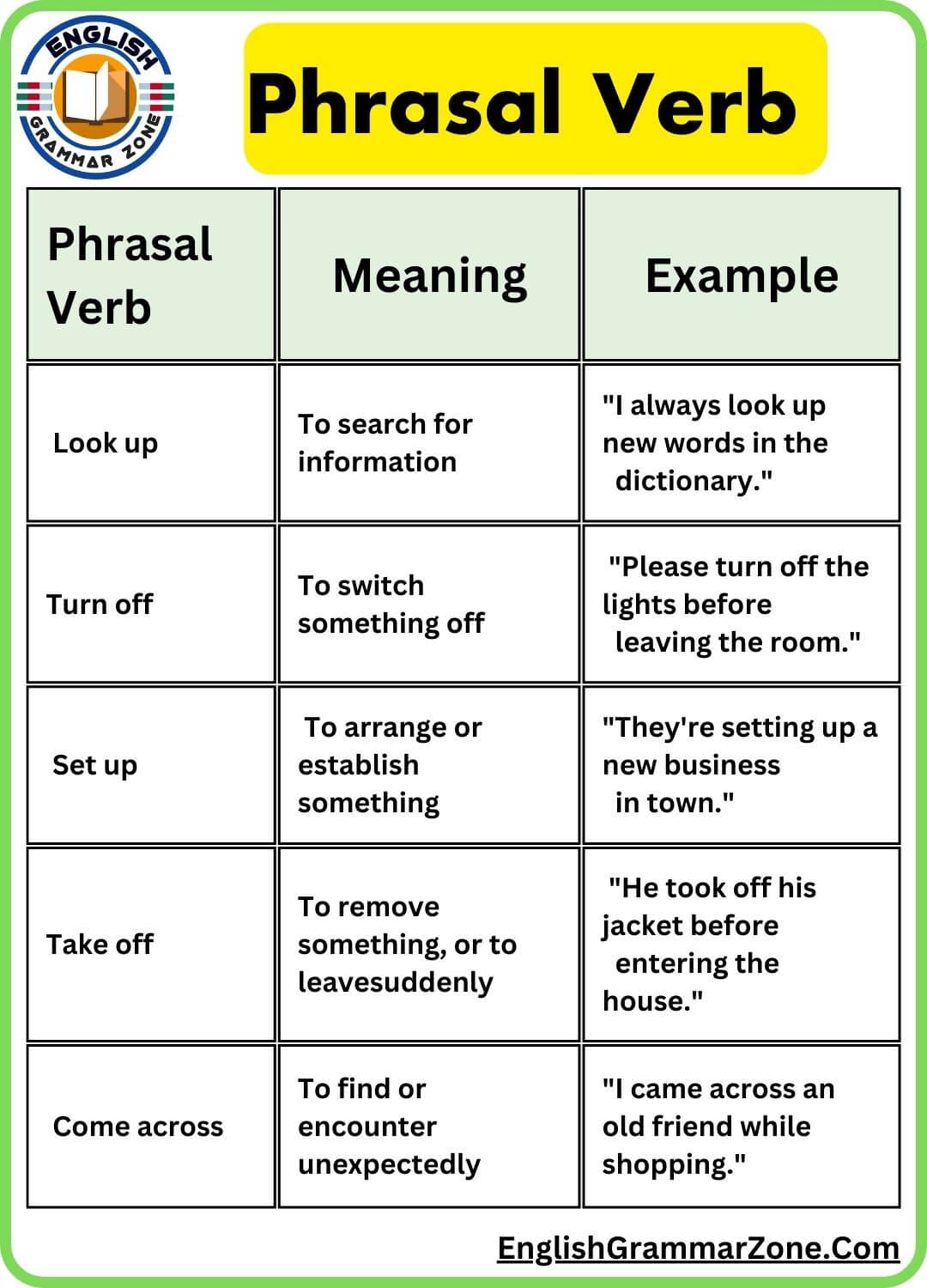Phrasal verbs are an essential part of the English language, combining a verb with one or more particles to create unique meanings. Learning phrasal verbs with meaning and example sentences can significantly improve your communication skills, making you sound more natural and fluent. These versatile phrases are widely used in daily conversations, writing, and even professional communication. By understanding their meanings and practicing their usage, you can effectively enhance your English proficiency.
Phrasal Verb :
| Phrasal Verb | Meaning | Example |
| Look up | To search for information | “I always look up new words in the dictionary.” |
| Turn off | To switch something off | “Please turn off the lights before leaving the room.” |
| Set up | To arrange or establish something | “They’re setting up a new business in town.” |
| Take off | To remove something, or to leave suddenly | “He took off his jacket before entering the house.” |
| Come across | To find or encounter unexpectedly | “I came across an old friend while shopping.” |
| Get along | To have a good relationship with someone | “I get along well with my colleagues.” |
| Look forward to | To anticipate with pleasure | “I’m looking forward to our meeting tomorrow.” |
| Break up | To end a relationship | “They broke up after dating for two years.” |
| Bring up | To raise a topic or issue | “I don’t want to bring up the subject of money again.” |
| Turn on | To switch something on | “Can you turn on the radio, please?” |
| Run into | To meet unexpectedly | “I ran into Sarah at the supermarket yesterday.” |
| Give up | To stop doing something, to surrender | “Don’t give up on your dreams.” |
| Go over | To review or examine something | “Let’s go over the details one more time.” |
| Put off | To postpone or delay something | “They decided to put off their vacation until next year.” |
| Turn down | To refuse or reject something | “She turned down the job offer because of the low salary.” |
| Get over | To recover from something (emotionally) | “It took me a long time to get over my fear of flying.” |
| Come up with | To produce or suggest an idea or solution | “She came up with a brilliant plan to solve the problem.” |
Picture: 1


Frequently Asked Questions About Phrasal Verbs With Meaning And Example
What Are Phrasal Verbs?
Phrasal verbs are expressions formed by combining a verb with a preposition, adverb, or both. This combination often changes the original meaning of the verb. For instance, the verb “give” has a completely different meaning when combined with “up” to form “give up,” which means to quit or stop doing something.
Example:
- She decided to give up smoking for a healthier lifestyle.
Why Are Phrasal Verbs Important?
Phrasal verbs are vital because they are commonly used by native English speakers in both formal and informal contexts. Knowing them helps you:
- Understand everyday conversations better.
- Express ideas more naturally.
- Expand your vocabulary effectively.
Example:
- Let’s look into the matter before making a decision. (“Look into” means to investigate.)
How Can I Learn Phrasal Verbs Effectively?
Here are some tips to master phrasal verbs:
- Learn in Context: Study phrasal verbs within sentences or stories to understand their usage.
- Group by Theme: Categorize phrasal verbs by topics like travel, emotions, or work.
- Practice Regularly: Use flashcards, quizzes, and exercises to test your knowledge.
- Write Examples: Create sentences using phrasal verbs to remember them better.
Example:
- He ran into his old friend at the market. (“Run into” means to meet someone unexpectedly.)
What Are Some Common Phrasal Verbs?
Here is a list of commonly used phrasal verbs with their meanings and examples:
- Break down: To stop working (usually a machine).
- The car broke down on the way to the airport.
- Call off: To cancel something.
- They called off the meeting due to bad weather.
- Put off: To delay or postpone.
- Don’t put off your homework until the last minute.
- Turn up: To arrive or appear unexpectedly.
- She turned up at the party without an invitation.
- Look after: To take care of someone or something.
- Could you look after my dog while I’m away?
Can Phrasal Verbs Have Multiple Meanings?
Yes, many phrasal verbs have multiple meanings depending on the context. For example:
- Take off:
- To remove something: Please take off your shoes before entering.
- To leave quickly: He took off without saying goodbye.
- To become successful: Her career took off after she won the award.
Understanding the context is key to interpreting the correct meaning.
How Do Phrasal Verbs Differ from Idioms?
Phrasal verbs are specific combinations of a verb and one or more particles that often carry a literal or figurative meaning. Idioms, on the other hand, are fixed expressions whose meanings cannot be deduced from the individual words.
Example:
- Phrasal verb: He gave up smoking. (“Gave up” means to quit.)
- Idiom: It’s raining cats and dogs. (This means it’s raining heavily.)
Where Can I Use Phrasal Verbs?
Phrasal verbs are versatile and can be used in various contexts, such as:
- Daily Conversations: I’ll pick you up at 7 PM.
- Workplace Communication: Let’s figure out a solution to this problem.
- Writing: She carried out the research meticulously.
Using them appropriately enhances both spoken and written communication.

